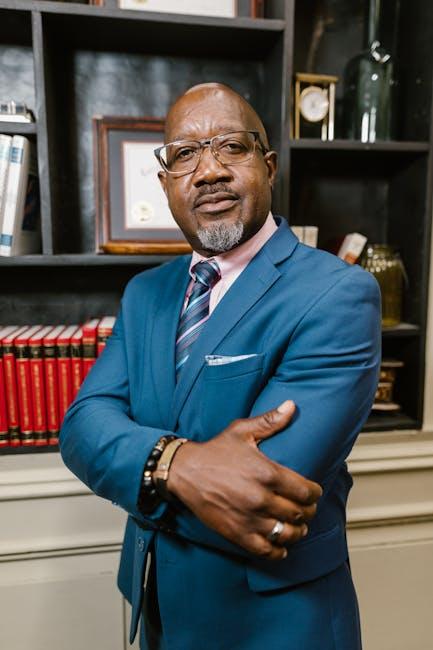In the golden years of life, when wisdom should be celebrated and tranquility embraced, a shadow often looms in the form of senior fraud and abuse. This unsettling reality affects countless elders, transforming what should be peaceful days into periods of uncertainty and distress. Navigating these troubled waters requires not just courage but also the right ally—someone who can stand as a guardian against injustice. Enter the lawyer, a beacon of hope and a defender of rights. But how does one find the right legal champion in a sea of professionals? In this guide, we will embark on a journey to uncover the steps to finding a lawyer who not only understands the intricacies of the law but also possesses the compassion to handle such sensitive cases. Together, we will ensure that the dignity and security of our cherished seniors are upheld, turning back the tide of exploitation with knowledge, empathy, and steadfast resolve.
Navigating the Legal Maze with Compassion: Finding the Right Advocate for Seniors
When it comes to addressing senior fraud and abuse, finding the right legal advocate is not just a matter of skill but also one of empathy and understanding. Seniors deserve a lawyer who not only possesses expertise in elder law but also approaches each case with compassion. Here are some key qualities to look for in a lawyer who can navigate the complexities of these sensitive cases:
- Specialization in Elder Law: Ensure the lawyer has a proven track record in handling cases of senior fraud and abuse. This specialization often means they have a deeper understanding of the nuances involved.
- Empathy and Communication Skills: An effective advocate should be able to communicate complex legal jargon in a way that is clear and reassuring. Look for someone who listens and shows genuine concern for the senior’s well-being.
- Local Experience: Familiarity with local laws and regulations is crucial. A lawyer with local experience can navigate the legal system more efficiently and may have established relationships with local authorities and courts.
- Client Testimonials and References: Reviews from other clients can provide insight into the lawyer’s ability to handle cases with care and success. Don’t hesitate to ask for references.
Choosing the right lawyer can make a significant difference in the pursuit of justice and peace of mind for seniors and their families. By focusing on these qualities, you can find an advocate who will stand by your side with the dedication and compassion that every senior deserves.

Unveiling the Expertise: Key Qualities to Seek in a Senior Fraud Attorney
When seeking a senior fraud attorney, it’s crucial to identify professionals who possess a blend of specialized skills and compassionate understanding. These experts should not only have a profound knowledge of elder law and financial fraud but also exhibit a deep commitment to advocating for the rights of seniors. Their experience should be reflected in their ability to navigate complex legal landscapes and their history of successful outcomes in similar cases. Empathy and patience are equally important, as these qualities enable them to work effectively with elderly clients and their families, ensuring that they feel heard and supported throughout the legal process.
- Extensive Experience: Look for attorneys with a track record of handling senior fraud cases. Their past experiences can provide invaluable insights and strategies tailored to these unique situations.
- Strong Communication Skills: An attorney who can clearly explain legal jargon and processes is essential. They should be able to break down complex issues into understandable terms, ensuring clients are well-informed.
- Compassionate Approach: Dealing with senior fraud requires sensitivity and understanding. An attorney who demonstrates genuine care and patience can make the process less daunting for affected seniors.
- Resourceful Network: A well-connected attorney can leverage relationships with experts and investigators to build a robust case, offering a better chance of a favorable outcome.
Guiding Light in Dark Times: Resources and Referrals for Legal Support
In moments when the trust of our cherished elders is violated, it’s crucial to know where to turn for help. Finding the right legal support can be daunting, but there are numerous resources available to guide you through the process. Legal aid organizations are often a good starting point, offering services tailored to seniors facing fraud and abuse. They can provide invaluable advice and sometimes even free representation. Additionally, state bar associations often have referral services to connect you with experienced attorneys who specialize in elder law.
Another helpful resource is the National Center on Elder Abuse (NCEA), which offers a wealth of information and guidance on how to address elder abuse, including legal recourse. Consider reaching out to local senior centers or community legal clinics, which may have partnerships with lawyers willing to offer pro bono services or reduced fees. Remember, you are not alone in this fight; there are compassionate professionals ready to help protect the rights and dignity of our elders.
Empowering Decisions: Questions to Ask When Choosing Your Legal Champion
Choosing the right legal advocate in senior fraud and abuse cases can be a pivotal step towards justice and peace of mind. As you embark on this journey, consider asking potential lawyers a series of probing questions that can illuminate their suitability for your unique situation. Here are some thoughtful inquiries to guide your decision:
- What is your experience with elder law and senior fraud cases? Understanding their background can reveal how seasoned they are in navigating the intricacies of such sensitive cases.
- Can you share success stories or testimonials from past clients? Real-world examples and client feedback can provide insight into their effectiveness and reputation.
- How do you communicate with your clients? Ensuring that you will be kept informed and involved in the process is crucial for peace of mind.
- What are your fees, and how are they structured? Transparency in financial matters can prevent unexpected surprises down the line.
By posing these essential questions, you can empower yourself to make a well-informed choice, ensuring that your legal champion is not just skilled, but also aligned with your values and expectations.


